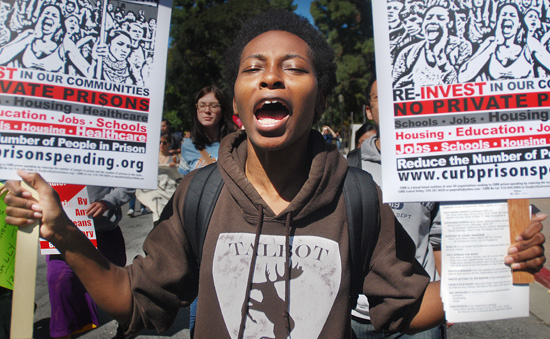Lincoln Ellis was arrested in the fall of 2002 at a protest on the buildup to the Iraq war. He received help from a National Lawyers Guild attorney and was not charged.
Now Ellis is a second-year student at the UCLA School of Law and a board member of the Guild’s Bruin chapter. He also works as a Guild legal observer, and watched and recorded police action on campus at the March 4 National Day of Action to Defend Education.
“(As a legal observer), you learn a lot about the law, the rights of protesters, what constitutes excessive force and defending protesters who are accused of some crime,” Ellis said. “You also learn about why people are so upset they’re willing to put their lives on hold and spend hours or even days out in the street expressing their discontent.”
The Guild is a progressive organization of students and lawyers that aims to protect human rights. For example, legal observers document law enforcement efforts, such as use of force, that impede demonstrators’ capacity to express their views. The information can then help Guild attorneys defend the rights of protesters in court.
During the Day of Action, about a dozen UCLA law students, as well as several other observers including attorneys and Loyola Law School students, followed protests on campus and in downtown Los Angeles. They wore neon green hats to differentiate themselves from the crowds.
Observers can also educate inexperienced demonstrators and act as a liaison between protest organizers and the police, said Gary Blasi, a UCLA law professor.
“My main goal is to try to discourage or deter the police from using force that’s unconstitutional, unethical,” Ellis said. “Another underlying philosophy (behind observing) is that popular movements and organizing are an important way of creating some changes I and NLG want to see in society.”
Ellis and other observers followed demonstrators from Bruin Plaza to the sit-in at the chancellor’s office in Murphy Hall. He said the observers had been taking notes, but he was not aware of any police misconduct during the morning or early afternoon.
“(During the demonstrations) I’ve learned that people have a lot of questions about the law, and it’s rewarding to be in a position to help people understand what the law is and help them exercise their rights,” Ellis said.
Legal observers only work at protests that are for a cause the Guild supports and at those where organizers have requested their presence, Ellis said. The UCLA chapter voted and agreed to support the March 4 protests.
Still, observers are trained to respond objectively to what they see, Blasi said.
Kolleen Duley, a UCLA law student who has worked as a legal observer, said it is easy to tell when police cross the line.
“Police can use a certain amount of force, but it’s fairly obvious when, for example, you see a student and a police comes unprovoked and pushes them with two arms,” Duley said.
UCLA’s Guild chapter recently sent a letter to Chancellor Gene Block demanding an end to police abuse of non-violent protesters after the November UC Board of Regents protests.
Before March 4, the chapter met with University police to discuss the letter, as well as general topics like safety concerns and respect for demonstrators, police spokeswoman Nancy Greenstein said.
“Legal observers have an important role, and we appreciate that they point out concerns in an objective fashion and help everyone conduct themselves more appropriately,” Greenstein said.
About seven legal observers worked at UC Berkeley, according to Darin Ranahan, a member of the university’s Guild chapter.
The San Francisco Bay Area Guild chapter also expected UC Santa Cruz and San Francisco State University to attract legal observers, said Carlos Villareal, executive director of the chapter.
For Ellis, legal observing is a way to stay active in social justice work. “I was just overwhelmed by a sense of alienation (when I arrived at law school) ““ everyone was on a corporate track,” Ellis said. “Part of legal observing and working with the (Guild) is keeping a sense of who I am and why I came to law school in the first place: to make the world a better place.”
